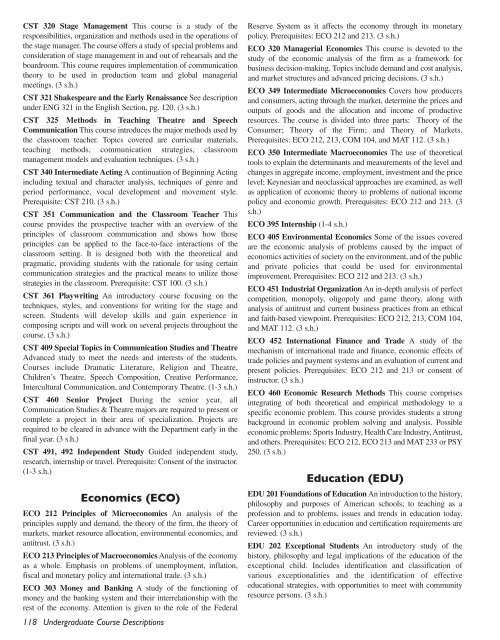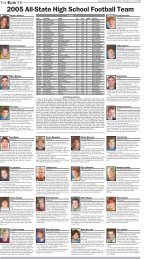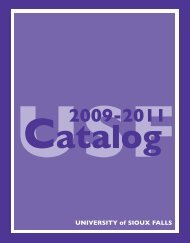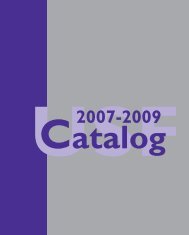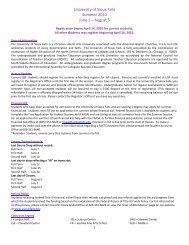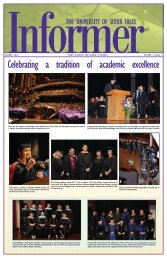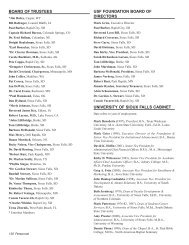USF TELEPHONE DIRECTORY - University of Sioux Falls
USF TELEPHONE DIRECTORY - University of Sioux Falls
USF TELEPHONE DIRECTORY - University of Sioux Falls
You also want an ePaper? Increase the reach of your titles
YUMPU automatically turns print PDFs into web optimized ePapers that Google loves.
CST 320 Stage Management This course is a study <strong>of</strong> the<br />
responsibilities, organization and methods used in the operations <strong>of</strong><br />
the stage manager. The course <strong>of</strong>fers a study <strong>of</strong> special problems and<br />
consideration <strong>of</strong> stage management in and out <strong>of</strong> rehearsals and the<br />
boardroom. This course requires implementation <strong>of</strong> communication<br />
theory to be used in production team and global managerial<br />
meetings. (3 s.h.)<br />
CST 321 Shakespeare and the Early Renaissance See description<br />
under ENG 321 in the English Section, pg. 120. (3 s.h.)<br />
CST 325 Methods in Teaching Theatre and Speech<br />
Communication This course introduces the major methods used by<br />
the classroom teacher. Topics covered are curricular materials,<br />
teaching methods, communication strategies, classroom<br />
management models and evaluation techniques. (3 s.h.)<br />
CST 340 Intermediate Acting A continuation <strong>of</strong> Beginning Acting<br />
including textual and character analysis, techniques <strong>of</strong> genre and<br />
period performance, vocal development and movement style.<br />
Prerequisite: CST 210. (3 s.h.)<br />
CST 351 Communication and the Classroom Teacher This<br />
course provides the prospective teacher with an overview <strong>of</strong> the<br />
principles <strong>of</strong> classroom communication and shows how those<br />
principles can be applied to the face-to-face interactions <strong>of</strong> the<br />
classroom setting. It is designed both with the theoretical and<br />
pragmatic, providing students with the rationale for using certain<br />
communication strategies and the practical means to utilize those<br />
strategies in the classroom. Prerequisite: CST 100. (3 s.h.)<br />
CST 361 Playwriting An introductory course focusing on the<br />
techniques, styles, and conventions for writing for the stage and<br />
screen. Students will develop skills and gain experience in<br />
composing scripts and will work on several projects throughout the<br />
course. (3 s.h.)<br />
CST 409 Special Topics in Communication Studies and Theatre<br />
Advanced study to meet the needs and interests <strong>of</strong> the students.<br />
Courses include Dramatic Literature, Religion and Theatre,<br />
Children’s Theatre, Speech Composition, Creative Performance,<br />
Intercultural Communication, and Contemporary Theatre. (1-3 s.h.)<br />
CST 460 Senior Project During the senior year, all<br />
Communication Studies & Theatre majors are required to present or<br />
complete a project in their area <strong>of</strong> specialization. Projects are<br />
required to be cleared in advance with the Department early in the<br />
final year. (3 s.h.)<br />
CST 491, 492 Independent Study Guided independent study,<br />
research, internship or travel. Prerequisite: Consent <strong>of</strong> the instructor.<br />
(1-3 s.h.)<br />
Economics (ECO)<br />
ECO 212 Principles <strong>of</strong> Microeconomics An analysis <strong>of</strong> the<br />
principles supply and demand, the theory <strong>of</strong> the firm, the theory <strong>of</strong><br />
markets, market resource allocation, environmental economics, and<br />
antitrust. (3 s.h.)<br />
ECO 213 Principles <strong>of</strong> Macroeconomics Analysis <strong>of</strong> the economy<br />
as a whole. Emphasis on problems <strong>of</strong> unemployment, inflation,<br />
fiscal and monetary policy and international trade. (3 s.h.)<br />
ECO 303 Money and Banking A study <strong>of</strong> the functioning <strong>of</strong><br />
money and the banking system and their interrelationship with the<br />
rest <strong>of</strong> the economy. Attention is given to the role <strong>of</strong> the Federal<br />
118 Undergraduate Course Descriptions<br />
Reserve System as it affects the economy through its monetary<br />
policy. Prerequisites: ECO 212 and 213. (3 s.h.)<br />
ECO 320 Managerial Economics This course is devoted to the<br />
study <strong>of</strong> the economic analysis <strong>of</strong> the firm as a framework for<br />
business decision-making. Topics include demand and cost analysis,<br />
and market structures and advanced pricing decisions. (3 s.h.)<br />
ECO 349 Intermediate Microeconomics Covers how producers<br />
and consumers, acting through the market, determine the prices and<br />
outputs <strong>of</strong> goods and the allocation and income <strong>of</strong> productive<br />
resources. The course is divided into three parts: Theory <strong>of</strong> the<br />
Consumer; Theory <strong>of</strong> the Firm; and Theory <strong>of</strong> Markets.<br />
Prerequisites: ECO 212, 213, COM 104, and MAT 112. (3 s.h.)<br />
ECO 350 Intermediate Macroeconomics The use <strong>of</strong> theoretical<br />
tools to explain the determinants and measurements <strong>of</strong> the level and<br />
changes in aggregate income, employment, investment and the price<br />
level; Keynesian and neoclassical approaches are examined, as well<br />
as application <strong>of</strong> economic theory to problems <strong>of</strong> national income<br />
policy and economic growth. Prerequisites: ECO 212 and 213. (3<br />
s.h.)<br />
ECO 395 Internship (1-4 s.h.)<br />
ECO 405 Environmental Economics Some <strong>of</strong> the issues covered<br />
are the economic analysis <strong>of</strong> problems caused by the impact <strong>of</strong><br />
economics activities <strong>of</strong> society on the environment, and <strong>of</strong> the public<br />
and private policies that could be used for environmental<br />
improvement. Prerequisites: ECO 212 and 213. (3 s.h.)<br />
ECO 451 Industrial Organization An in-depth analysis <strong>of</strong> perfect<br />
competition, monopoly, oligopoly and game theory, along with<br />
analysis <strong>of</strong> antitrust and current business practices from an ethical<br />
and faith-based viewpoint. Prerequisites: ECO 212, 213, COM 104,<br />
and MAT 112. (3 s.h.)<br />
ECO 452 International Finance and Trade A study <strong>of</strong> the<br />
mechanism <strong>of</strong> international trade and finance, economic effects <strong>of</strong><br />
trade policies and payment systems and an evaluation <strong>of</strong> current and<br />
present policies. Prerequisites: ECO 212 and 213 or consent <strong>of</strong><br />
instructor. (3 s.h.)<br />
ECO 460 Economic Research Methods This course comprises<br />
integrating <strong>of</strong> both theoretical and empirical methodology to a<br />
specific economic problem. This course provides students a strong<br />
background in economic problem solving and analysis. Possible<br />
economic problems: Sports Industry, Health Care Industry, Antitrust,<br />
and others. Prerequisites: ECO 212, ECO 213 and MAT 233 or PSY<br />
250. (3 s.h.)<br />
Education (EDU)<br />
EDU 201 Foundations <strong>of</strong> Education An introduction to the history,<br />
philosophy and purposes <strong>of</strong> American schools; to teaching as a<br />
pr<strong>of</strong>ession and to problems, issues and trends in education today.<br />
Career opportunities in education and certification requirements are<br />
reviewed. (3 s.h.)<br />
EDU 202 Exceptional Students An introductory study <strong>of</strong> the<br />
history, philosophy and legal implications <strong>of</strong> the education <strong>of</strong> the<br />
exceptional child. Includes identification and classification <strong>of</strong><br />
various exceptionalities and the identification <strong>of</strong> effective<br />
educational strategies, with opportunities to meet with community<br />
resource persons. (3 s.h.)


